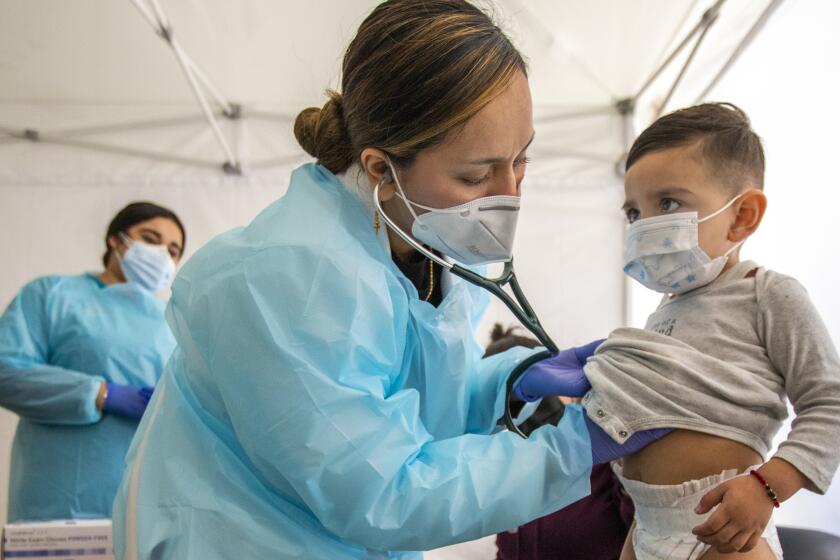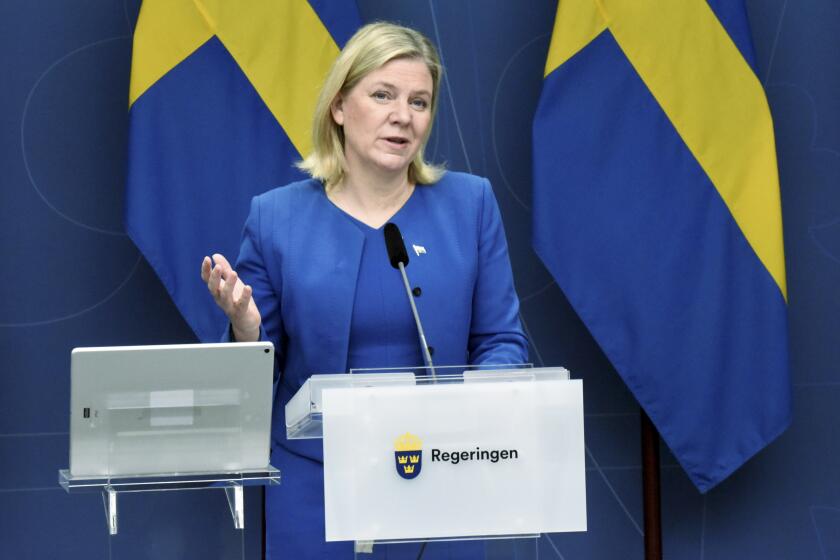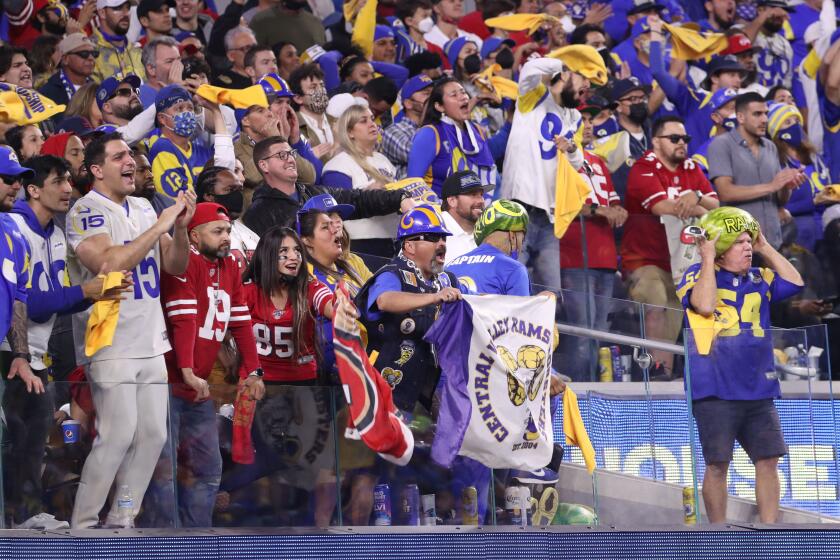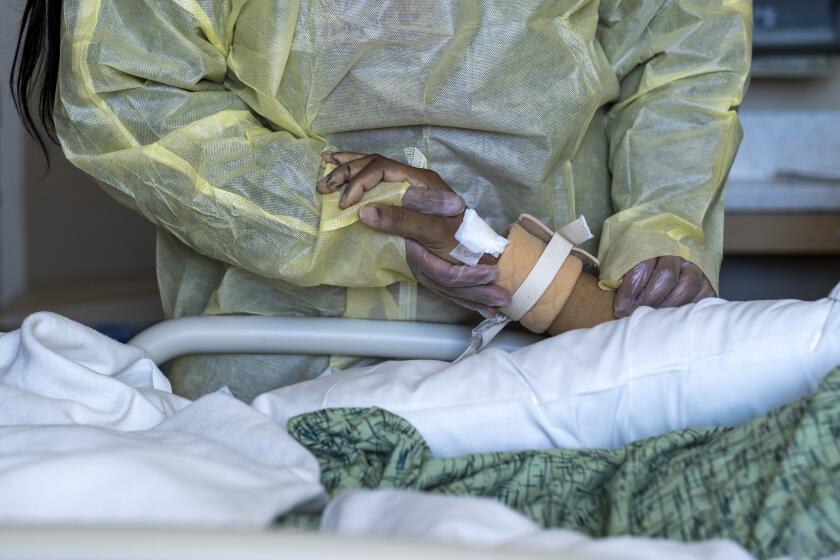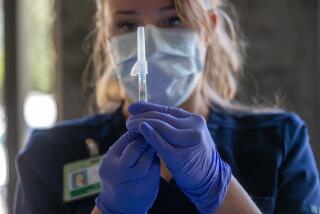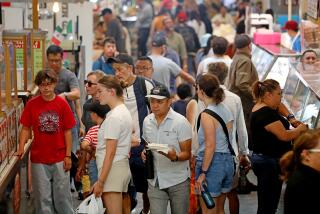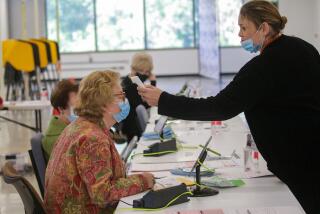L.A. County unveils plans to drop some mask rules once COVID conditions improve
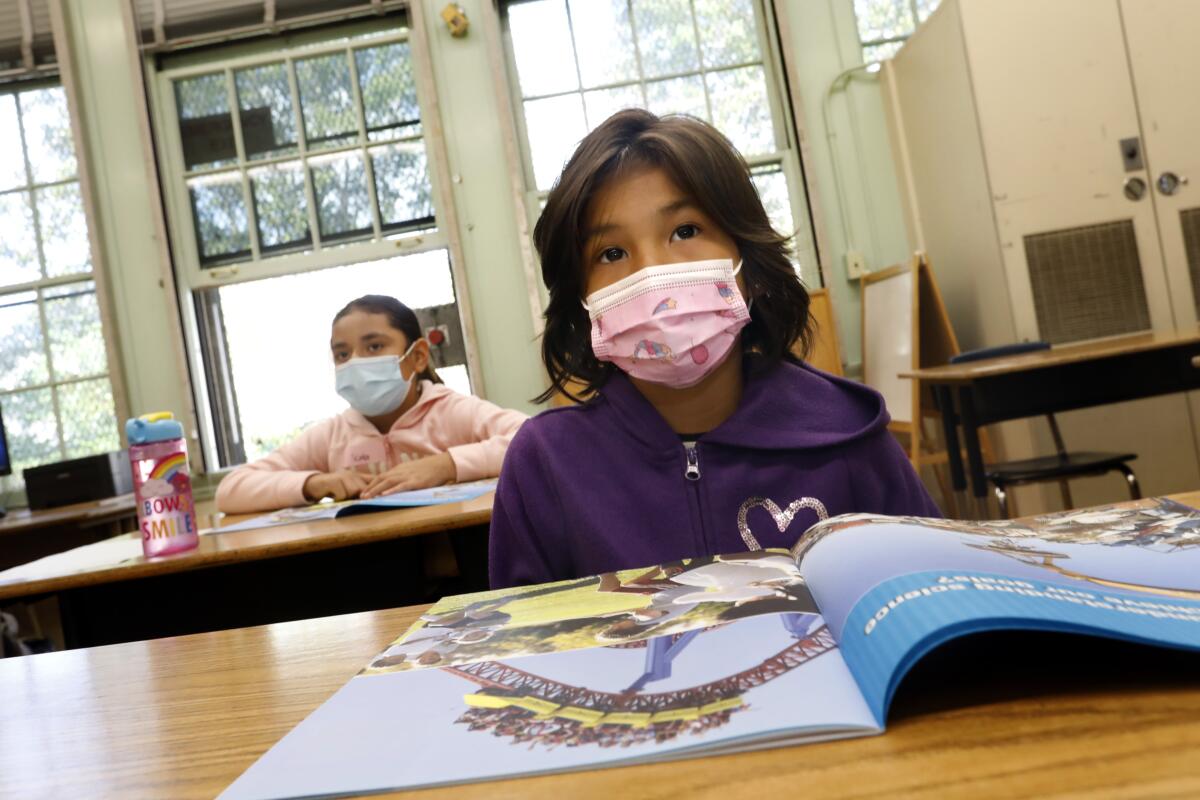
Outlining how health and safety rules could be loosened as the coronavirus’ Omicron variant continues to wane, Los Angeles County officials said Thursday that face coverings no longer will be required in certain outdoor settings once COVID-19 hospitalizations drop, and indoor mask rules could be loosened after further gains.
The county would enter this “post-surge” phase when coronavirus-positive hospitalizations drop below 2,500 for seven straight days, about 26% below the current figure. As of Wednesday, just under 3,400 coronavirus-positive patients were hospitalized countywide, down 29% from the apparent high mark of the Omicron wave, set a little more than two weeks ago, when about 4,800 were hospitalized.
It’s unlikely L.A. County will reach that goal in time for the Feb. 13 Super Bowl, but it could come relatively soon after. Public Health Director Barbara Ferrer said the benchmark was developed in consultation with hospitals in the county, which agreed that they could return to most of their customary operations with fewer than 2,500 coronavirus-positive patients.
After hitting this trigger, health officials would lift mask requirements at outdoor “mega” events with at least 5,000 attendees — such as those at the Hollywood Bowl, Dodger Stadium, SoFi Stadium and Los Angeles Memorial Coliseum — as well as outdoor spaces at child-care settings and K-12 schools.
Currently, universal masking is required in both indoor and outdoor settings of school campuses in L.A. County, except when eating or drinking and in outdoor settings where physical distancing can be reliably maintained.
Under the criteria, which Ferrer unveiled Thursday, an even wider relaxation of face covering rules is still a ways off.
For instance, masks still will be required at indoor establishments and events until L.A. County records two consecutive weeks at or below “moderate” coronavirus transmission, as defined by the U.S. Centers for Disease Control and Prevention.
Reaching that tier would require the county’s case rate to drop below 50 weekly coronavirus cases per 100,000 people, and for the positive test rate to be less than 8%, for two consecutive weeks.
The positivity rate had fallen under 8% on Wednesday.
L.A. County is averaging about 1,100 new coronavirus cases per 100,000 people every week, a little more than one-third of the Omicron peak. During the last wave in which the county had this level of high transmission — in January 2021 — it took about two months for case rates to drop below 50 per 100,000 residents.
As of Thursday, only five counties nationwide were considered to have “moderate” or “low” transmission, according to the CDC. Every other county, including L.A., is considered to have “high” transmission, the worst category on the federal agency’s four-tier scale.
Even once L.A. County reaches moderate transmission, officials will not further rescind masking requirements unless there are “no emerging reports of significantly circulating new variants of concern that threaten vaccine effectiveness,” according to Ferrer.
Masks also still would have to be worn where required by the state or federal government, including in healthcare settings, schools, airports and while using public transportation.
At first, it appeared Omicron might be a “great unifier,” spreading equally through the county, but then it took a turn toward lower-income communities of color.
L.A. County health officials are far from alone in looking to the future as the Omicron surge subsides. And masks have been a topic of particularly keen interest.
All of California is under a mask order that applies to indoor public spaces. That mandate is set to expire Feb. 15, and it remains to be seen whether it will be extended.
If the state does allow the mask order to expire, counties with no local mask order of their own, including Orange, San Diego, Riverside and San Bernardino counties, would be on track to see their mask mandate lifted.
Like L.A. County, other counties with local mask orders will also need to make decisions about whether to revise their criteria to end their mandates.
In Contra Costa County, the Bay Area’s third-most-populous county, health officials expect to revise criteria to lift their mask mandate based on coronavirus-positive hospitalization rates, rather than new daily cases.
Sweden’s announcement that it will ditch coronavirus restrictions follows similar moves by fellow Scandinavian countries Norway and Denmark.
“It’s really all about the healthcare systems: Are they going to be able to tolerate another bump in cases that is expected to happen when we lift some of these restrictions?” Dr. Ori Tzvieli, Contra Costa County’s acting health officer, told his Board of Supervisors this week.
Tzvieli said he suspected most Bay Area counties would lift their mask mandates within a month of the state, but he said it would vary by county.
Compared with the Bay Area, L.A. County’s winter COVID-19 death rate, and its vaccination and booster rates, have been worse. L.A. County has higher levels of poverty and crowded housing making it more vulnerable, and health officials say it’s important to move cautiously in lifting mask orders.
Moving too quickly could result in hurting Black and Latino communities that have already suffered disproportionate losses in the pandemic, Ferrer said. From Jan. 15 to Jan. 28, Black and Latino residents of L.A. County were dying of COVID-19 at double the rate of white residents.
“The pandemic has illuminated stark inequities in the burden of disease…. These disparities did not happen by chance, and they reflect decades of disinvestment, marginalization and racism,” Ferrer said. “Calls for minimizing public health response activities can have an unintended consequence of exacerbating inequitable outcomes.”
Ferrer said it still makes sense to consider coronavirus case rates to determine when to lift indoor mask orders, because case rates drive hospitalizations and deaths, and high transmission can help new variants of concern develop. She noted that the county’s mask orders are consistent with the CDC’s recommendations on when to mask in indoor public settings.
When pills that help treat COVID-19 are more available, there will be a greater assurance that most people who get infected won’t have a severe illness or die, Ferrer said.
L.A. County is averaging 60 to 70 COVID-19 deaths a day, a rate not seen in more than 10 months.
And protecting the county’s hospitals will be important for everyone, Ferrer said, because the pandemic has driven “higher rates of mortality across the board.”
Some health experts preferred to wait before agreeing it was prudent to lift indoor mask mandates.
“March seems soon to me to take away masks. I think we need to see more time to understand what’s going to happen,” Dr. Sarah Doernberg, associate professor of infectious diseases at UC San Francisco, said in an online discussion Thursday. She said it would be more problematic to lift a mask mandate and then have to re-implement it if cases surge again.
Others are itching to lift the mask mandates. This week, L.A. County Supervisor Kathryn Barger said she believes “individuals should be allowed to make an informed choice about whether to mask up or not.”
After California Gov. Gavin Newsom and L.A.
Officials announced Thursday that opponents of L.A. city rules mandating proof of vaccination at indoor restaurants and other businesses can start gathering signatures for their petition to potentially overturn the requirement.
The repeal effort, which also targets local rules requiring proof of vaccination at large outdoor events, must gather nearly 65,000 valid signatures from registered L.A. city voters to move forward.
If repeal proponents get enough signatures within the allotted time — roughly four months — the City Council must either rescind the rules or put the issue on the ballot for voters to decide.
L.A.’s expansive rules, which went into effect in early November, mandate proof of full COVID-19 vaccination to enter indoor restaurants, shopping centers, movie theaters, hair and nail salons, coffee shops, gyms, museums, bowling alleys, performance venues and other spaces.
Even if the effort were to succeed, the city would still be bound by rules issued by the county Department of Public Health. Among those is a more limited vaccine-verification requirement that applies to indoor bars, wineries, breweries, nightclubs and lounges.
This is the latest coronavirus wave where, compared to Southern California, the Bay Area has fared relatively better, and local officials this time credit high rates of vaccination and booster shots.
In adopting its ordinance, the city of L.A. also required attendees of outdoor events with 5,000 or more people to show proof of vaccination or that they’ve recently tested negative for the coronavirus.
At the time, the requirement was stricter than the wider county public health order — which imposed such a verification requirement on outdoor events with at least 10,000 attendees. That’s no longer the case, though, as county officials lowered their threshold to 5,000 in mid-January.
After rapidly spreading across the state during the last two months, California now appears to be shaking off the worst of the Omicron wave.
Over the last week, the state has reported an average of about 48,500 new coronavirus cases per day — down significantly from the height of the latest surge, when the daily case rate fluctuated between 120,000 and 122,000, according to data compiled by The Times.
L.A. County has made similar progress, reporting an average of just under 15,900 new cases a day over the last week, down significantly from last month’s peak of about 44,000 daily cases.
Hospitalizations are starting to drop in California too. There were 12,643 coronavirus-positive people hospitalized statewide Wednesday — down 18% from the Omicron-era peak of 15,435, which was recorded Jan. 21.
More to Read
Sign up for Essential California
The most important California stories and recommendations in your inbox every morning.
You may occasionally receive promotional content from the Los Angeles Times.
